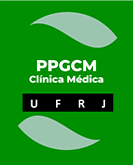| Code | Name | Credit | Theoretical | Practical | Syllabus |
| FMM813 | International Seminar | 1.0 | 15 | 0 | This innovative seminar aims to provide updated information on internal medicine topics and related subspecialties, along with extensive discussion on biomedical, clinical, and basic research techniques related to these subspecialties. |
| FMM814 | AC Seminar in Medicine | 1.0 | 15 | 0 | This seminar aims to provide updated information on internal medicine topics and related subspecialties, along with extensive discussion on biomedical, clinical, and basic research techniques related to these subspecialties. |
| FMM817 | Dermatology Special Topics | 2.0 | 10 | 20 | Understand the histopathology of normal skin and its appendages and the alterations occurring in the most common dermatological diseases in medical practice; stimulate discussion of research projects on disease mechanisms, clinical aspects, diagnosis, and treatment of skin conditions and their appendages; theoretical lectures in Dermatology disciplines. |
| FMM836 | Transdisciplinary Seminar | 1.0 | 15 | 0 | Integrative seminar bringing together graduate programs linked to the Faculty of Medicine, discussing issues pertinent to various areas, subareas, and research lines. Featuring international guests and presentations in Portuguese and English. |
| FMM851 | Infection in Cancer: Innovations | 2.0 | 30 | 0 | This course offers a comprehensive and integrated approach to studying infections in immunocompromised patients, using scientific methodologies and advanced teaching technologies to promote excellence in research and clinical practice. |
| IQB730 | Innovation (Transversal Discipline) | 3.0 | 45 | * Transversal Discipline. Concept of innovation. Economic importance of innovation for the individual, the firm, and the development of nations. Strategies and environment for innovation. Planning and development of innovation. Opportunities for innovation. Intellectual property, industrial property. Legal aspects of innovation in Brazil. Relationship with the private sector and society. Fundraising. Social innovation. Innovation in the public sector. | |
| PAB803 | Introduction to Ethics in Research | 2.0 | 10 | 20 | The emergence of Bioethics. Streams of Bioethics. Education and Bioethics. Patient rights. Autonomy. Communication of diagnosis. End of life. Euthanasia and dysthanasia. Palliative care. Bioethics of the beginning of life. Ethics in human research. Ethics in experiments with animals. |
| SMI715 | Data Analysis Plan | 2.0 | 40 | 0 | I. INTRODUCTION Considering that biomedical research is based on the production of scientifically consistent evidence and that this consistency is evaluated by a community of researchers who follow procedures capable of generating hypotheses to be tested in order to adequately respond to their research questions, structuring a data analysis plan is fundamental for building solid scientific evidence. OBJECTIVES The objective of this course is to enable students to construct the data analysis plan based on their research project. II. CONTENT Basic concepts and methods: The goal is to present the main procedures for the elaboration of a data analysis plan based on the research question, study design, objectives, outcomes, and exposure and control (adjustment) variables. Students should be able to coordinate the main knowledge acquired in the basic master's courses to produce a data analysis plan consistent with their research project. III. TEACHING METHODOLOGY Seminars The teaching method is based on seminars where the main concepts for preparing a data analysis plan are covered through demonstration in SPSS using either the instructor's or students' databases. IV. ATTENDANCE Mandatory attendance is equal to or greater than 75% of the teaching time of the course. The attendance list must be signed by the student within the first thirty minutes after the start of each instructional activity of the course. V. EVALUATION Evaluation will be based on students' participation during the seminars and on the analysis of each student's individual data analysis plan. VI. TEACHING MATERIAL All teaching materials used in the course will be available for students in the IPPMG library or through a link to be provided at the beginning of the course. VII. PREREQUISITES Students must have been approved for entry into the PPGSMI and have an ongoing research project. They must have taken either the epidemiology or statistics course. |
| Credits to fulfill | 0.0 |






